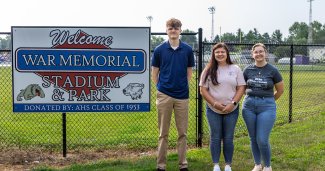
The Ada War Memorial Park in Ada, Ohio, hosts hundreds of families, recreation enthusiasts, and sports teams every year. Now patrons will have an easier time utilizing and navigating the park’s amenities thanks to Ohio Northern University College of Business students.
The students are collaborating with the Ada Park District to modernize park operations with a web-based scheduling and communication tool. Called Team Sideline, the tool enables on-line game scheduling and shelter house reservations; links field locations to Google maps; and enables patrons to stay informed about what’s happening at the park on any given day and time.
From researching the best tool to implementing the solution, the business students are committed to sharing their time and expertise to help the village they’ve come to know as “home” during their college years.
Kylie Frazier, a junior management major, was one of three students who worked on the project this summer. Having grown up in Bellefontaine, Ohio, she knows that parks are the center of community life in small towns.
“The Ada Park has been there forever. It feels good to be able to give people the freedom and the opportunity to utilize the park in ways that weren’t available before.”
Overseeing the park project, wearing both his professor hat and Dad/coach hat, is Dr. Matt Lambdin, director of experiential learning at the Dicke College of Business Administration.
An Ada resident and former volunteer coach for his kids’ teams, he witnessed the park’s paper-based scheduling system become increasingly problematic as the park’s usage grew.
Booking overlaps and scheduling conflicts frequently occurred as teams and coaches vied for field time. Additionally, Google maps wasn’t set up to guide out-of-town parents to the particular field their child was playing on in the park.
“And if a local resident wanted to walk the track, or hit ground balls with their kid, they never knew when a space was not in use,” said Lambdin.
He conducted an informal “listening tour” to validate his belief that it was time for a technology-based system.
“I talked with people on the sidelines of games, with past volunteers and current volunteers, and with community members. People voiced different concerns, but they were all manageable, so that’s how this project came about.”
As a first step, sport management students under the direction of Dr. Brian Hofman, associate professor of sport management, researched the best technology solution for the park for a class project.
Once the park district gave its approval, three business students spent April through August adapting the Team Sideline program to the needs of the Ada Park. The students included Kylie, junior management major, Harrison Fagg, senior marketing major, and Sage Funchion, senior management major.
Kylie met with Dr Jimmy Wilson, associate professor of management and Geographic Information Systems to learn how GIS and Google Maps worked. She then labeled all the park’s practice and game fields, the stadium, the shelters, and more, so that “anyone outside of Ada can just pull it up on the map and see exactly where they need to go,” she said.
The other two interns worked on setting up the scheduling/reservation system and training coaches how to use it.
“They learned the system forward and backward,” explained Lambdin, noting the students developed invaluable skills in project management.
“We took the time to do this the right way, which included time for testing and working out the bugs,” he said. “Students learned how to build a project timeline and how to manage limited resources effectively.”
The most important aspect of the project was getting to know the end-user, exploring the wants and needs of the coaches and regular community members who would be using the system.
“They had to take into account people who are 100% on board, people who might be wary of using a new system, and people who were just fine with the status quo. They created a system that addresses all those individual concerns. And I am most proud of this first group for their ability to work with a lot of different personalities,” said Lambdin.
Kylie said she approached the project by asking herself: “What would my grandma want? Would she be able to navigate this site?”
“We tried to think about the consumer wants, and find ways for everyone to benefit,” she said.
During Ada’s annual Farmers and Merchant Picnic in August, the three business students mingled with community members to share information about the new on-line system and give demonstrations on how it worked. At the start of the school year, they handed the project to two new business interns who are implementing next steps this fall.
“This project is going to help the community in a big way,” said Lambdin, “and I can’t wait to see the difference it’s going to make.”